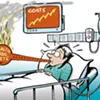Gov. Phil Scott on Wednesday signed into a law a bill that caps what Vermont hospitals can charge for certain specialty drugs, a measure that proponents say will help the state address its out-of-control health care costs.
The bill, H.266, applies to all drugs administered through outpatient clinics at eight of Vermont’s 14 hospitals, where patients encounter some of the highest price markups in the country. The cap goes into effect next year and could save insurance companies tens of millions of dollars annually, while limiting individual out-of-pocket expenses.
Owen Foster, chair of the Green Mountain Care Board, called the bill historic, describing it as a “first-in-the-nation effort to protect our chronically ill patients from excessive drug pricing.”
The new law comes as Vermont seeks ways to curb health care spending amid years of rapid growth, and it represents the sole measure to come out of the Statehouse this session that could have an immediate impact on premium rates.
And while hospitals have warned that the loss of revenue would force them to make tough decisions about their spending, that’s kind of the point, said Rep. Alyssa Black (D-Essex), chair of the House Health Care Committee, who sponsored the bill.
“You cannot fix the affordability crisis without removing money from the system,” Black said. “There is no other way.”
Vermont pays some of the highest insurance premiums in the U.S. And yet its largest insurer, Blue Cross Blue Shield of Vermont, has posted substantial losses in recent years, endangering its immediate future.
Health Care Leaders Are Scrambling to Prevent Another Major Insurance Hike

Health Care Leaders Are Scrambling to Prevent Another Major Insurance Hike
By Colin Flanders
Health Care
The insurer blames its precarious position on the high prices charged at Vermont hospitals — and in particular, the markups on drugs administered in the outpatient settings. Such medications typically require infusions or injections and are used to treat cancer, arthritis, autoimmune conditions and other diseases.
U.S. hospitals have long charged more for these drugs than what they pay the manufacturers. But the markups in Vermont are especially high. Vermont hospitals on average charge five times more than the average sales price, according to the RAND Corporation — nearly double the national upcharge.
The markup on some drugs can reach as high as 7,000 percent, such as for the cancer medication Neulasta, which boosts white blood cell counts to help patients going through chemotherapy avoid infections.
The drug sells for about $1,300 a year, according to Blue Cross. But the insurer reimburses the University of Vermont Medical Center about $85,000 for the drug, and that doesn’t even cover the hospital’s full asking price of $95,000.
“How is this not price gouging?” Black asked during a committee hearing last month.
Under the new law, hospitals will only be able to charge up to 120 percent of the average sales price. Executives say they routinely purchase drugs at prices beyond that cap and will lose money as a result. The financial hit could be as high as $70 million a year at the University of Vermont Health Network, according to network officials. Smaller hospitals, meanwhile, warn that they may be forced to close down the very clinics offering the drugs in question.
A provision in the bill seeks to prevent such a scenario by allowing hospitals to seek higher reimbursement rates from regulators should the cap prove a legitimate threat to access in rural areas.
Exactly how much money the bill will ultimately save insurance companies remains to be seen.
Blue Cross has said it could possibly reduce its requested premium rate increase by about $20 million — or 4 percent — based on an initial analysis of the cap’s projected savings. But that’s assuming hospitals don’t look to raise prices elsewhere to make up for their losses.
Hospital budget proposals are due to the Green Mountain Care Board by July 1.
